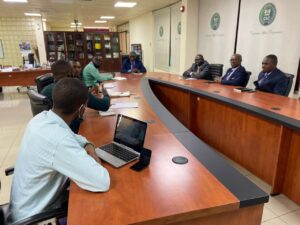A combined delegation of the Nigeria-based Action Group on Free Civic Space (AGFCS) and the Kenya-based Coast Civil Society Network on Human Rights (CCSNHR) paid a courtesy call on the Registrar General of the Corporate Affairs Commission (CAC) at the Commission’s headquarters in Abuja on July 5, 2023. The visit afforded the two leading civil society coalitions in Africa to deepen their understanding of non-profit regulation in Nigeria, and how effective collaboration between the Commission and non-profit organizations (NPOs) aids in strengthening the civic space.
Receiving the delegation, the Registrar General of the CAC enlightened them about the recent legal provisions in Nigeria’s corporate governance legislation—Companies and Allied Matters Act 2020—designed to improve financial transparency and the regulatory environment for NPOs to operate in Nigeria. An example is beneficial ownership provisions which mandate companies registered with the Commission from January 3 to disclose their persons of significant control or beneficial owners at the point of registration. Also, foreign-owned or international non-governmental organizations can now register with the Commission, which was not a requirement before now.
How does the CAC enforce compliance with the new regulatory provisions? Some NGOs face challenges in either understanding or fulfilling their compliance obligations espoused in CAMA 2020. However, initiatives like the NGO Regulatory Compliance Clinic hosted by Spaces for Change | S4C in partnership with the CAC are helping to bridge this gap in knowledge deficits and regulatory compliance. Beyond collaborating with NGOs like S4C to deliver compliance clinics to NPOs across the country, the Commission is also working with the Central Bank of Nigeria (CBN) and other banks to verify the status of incorporated entities on the CAC portal to increase compliance.
So, do Nigerian NPOs seamlessly access CAC’s corporate oversight services with relative ease? To improve service delivery, the Commission has digitized most of its services—ranging from registration to statutory reporting to the filing of bi-annual statements and annual returns— reducing the need for in-person visits. While not all services have been fully digitalized, significant progress has been made, benefiting NGOs and other entities.
There were also discussions around the duplicity of regulatory oversight for NPOs, with some state governments either suspending/banning NGO activities or introducing NGO Bills that merely duplicate CAC’s functions. Multiple federal and state regulations allocating overlapping roles and regulatory responsibilities to several agencies and departments hold enormous potential to shrink the civic space. It was a welcome relief to receive official clarification that the authority to regulate NGOs lies with the Federal Government, and suspensions/bans imposed by state authorities are only effective at the state level. Other issues discussed revolved around efforts of the Nigerian government to minimize the risk of terrorist financial abuse of non-profits especially in the conflict-ravaged regions of the country.
This visit formed part of the FGHR-backed Nigeria-Kenya learning exchange program between AGFCS and CCSNHR aimed at promoting cross-country learning and collaboration to safeguard the civic space. The AGFCS and CCSNHR appreciated the Commission’s laudable initiatives and discussed possibilities for replicating some of the regulatory best practices in Kenya.





















